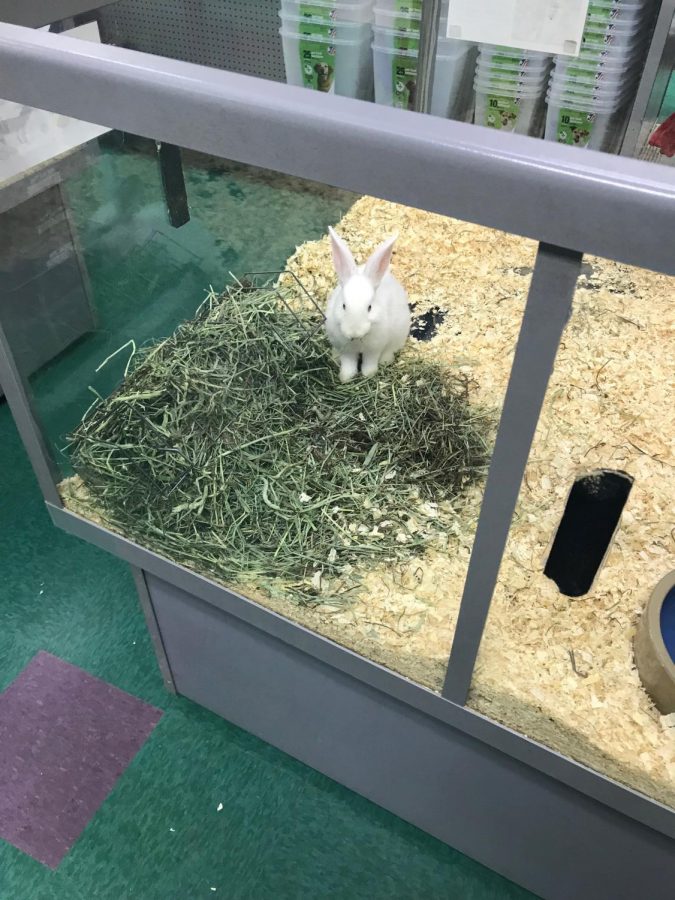Local Petland franchise closes due to investigation
Fairfax pet store allegedly practiced inhuman sourcing and treatment of rabbits
Photo courtesy of Shafuq Naseem
A rabbit at Petland sits in an enclosure with multiple other bunnies.
April 24, 2019
Fairfax pet store, Petland, is under investigation by the Fairfax County Police Department, who found 31 dead rabbits and one dead puppy in a freezer on the premises. Petland’s national headquarters in Ohio has removed the store’s franchise rights and cut ties with the store over the investigation’s findings.
The police investigation resulted from a Humane Society of the United States (HSUS) undercover investigation, where they found rabbits were dying without receiving any veterinary care. HSUS sent an investigator to work as an employee for approximately two months where 14 dead bunnies were discovered dead in a freezer. As seen on the video that HSUS posted on their Instagram, Petland employees claimed that the sick bunnies received no veterinary care, and were left to die.
“There’s like nothing we can do because they don’t get treated by a vet. When they’re sick, they’re sick. We just let them die,” said an unidentified employee in the HSUS video of their investigation.
In the past, Petland has been scrutinized for buying their puppies from puppy-mills, where puppies are bred in high-volume. They are often neglected, don’t receive proper veterinary care and are not able to exercise properly.
“Mills only care about the “end product.” They don’t look at the health of their adults or whether they are making good decisions. As a result, the adults are tired, undernourished, and untreated for any issues. The babies may have genetic illnesses or other issues that are unknown because there is no idea of what the animal’s health history is,” said Rebecca Weiske, WS Class of 2009 alumna and former Oracle editor
Weiske is now a second-year vet school student and worked for over 3 years in small animal specialty medicine and has over 10 years’ experience working as a veterinary technician.
Puppy mill puppies sold at stores like Petland for hundreds or thousands of dollars are often in poor health, even being sold with fully-developed illnesses. One customer who bought a Yorkshire Terrier from the Fairfax Petland said that after taking him home, realized that he had a developed virus, as well as an eye infection.
Now, the HSUS is reporting that the Fairfax location was purchasing their bunnies in a similar manner, from a high-volume bunny mill. According to the HSUS investigation, the bunnies were being sold from Wagner Farm in Centreville, Maryland where, allegedly, rabbits were held in small, unsanitary cages. This could explain the the bunnies’ rapid deaths. Additionally, the number of bunnies Wagner sold to Petland Fairfax required him to be licensed by the U.S. Department of Agriculture, which he was not.
According to Petland employees who were interviewed for this story, some of the store’s employees believe the information presented by the HSUS was exaggerated and did not fairly represent the company.
“All I’m going to say is that the news is really putting a bad image on us even though we’re not doing any of the stuff that they’re saying. The news is making people have a horrible perspective of Petland,” said a Petland employee, who spoke on condition of anonymity due to fears of public backlash.
Similarly, Petland Inc. released a statement claiming that the HSUS investigation was ‘highly suspicious,’ as the HSUS did not reach out to Petland Inc when the instance occurred in January.
“HSUS’s John Goodwin, who is quoted in the story, met with Petland’s VP of Animal Welfare two weeks ago and made no mention of any concerns. This further reinforces our belief that their interest is not animal welfare, but the furtherance of their political agenda against pet stores,” said Petland Inc. in their released statement about the investigation.
Not only is the HSUS being criticized for not reporting this information in a timely manner, the HSUS has been scrutinized in the past for not being as “humane” as they present themselves to be as well. According to their website, the HSUS is not affiliated with any community-based humane societies or pet shelters and does not run a single pet shelter. However, they do report that they operate rescue teams, community-based programs and five wildlife sanctuaries and care centers that directly assist tens of thousands of animals each year. Regardless, they receive low marks from charity organizations, such as Charity Watch, which is a nonprofit that provides information about charities’ financial efficiency, accountability, governance, and fundraising. These ratings due to their spending practices. For example, according to past released tax returns, less than one percent of their budget consisted of giving grants to shelters.
According to Weiske it is important that people are educated on the benefits of adopting from a shelter or responsible breeder rather than ‘shopping’ for pets from stores that encourage unethical breeding, such as Petland.
It is also important to note that shopping for pets is not necessarily ‘cruel,’ if consumers are supporting responsible breeding techniques. Responsible breeding consists of the breeder making ethical choices based on the genetic health, temperament, and overall look of the animal.
“Buying from the actual breeder isn’t all that bad as long as you follow the proper steps into buying them like going to the breeder’s environment and meeting the parents of the puppy, checking into their medical history, etc,” said junior Sarah Jimenez.
There are multiple reputable locations people can go to if interested in adopting an animal. For one, the Fairfax County Animal Shelter has approximately 4,000-5,000 animals that come through their door each year.
“I knew from the beginning that Petland was a bad place for animals,” said Jimenez. “The more people that shop instead of adopt let these animals continue to be tortured.”





